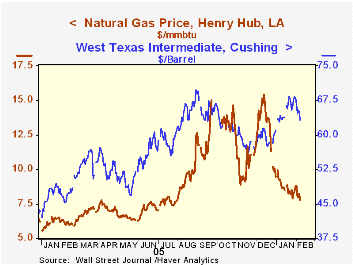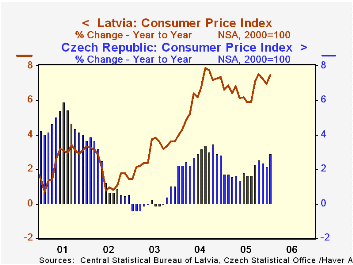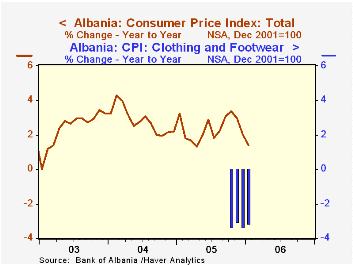 Global| Feb 08 2006
Global| Feb 08 2006Mortgage Applications Lower Again
by:Tom Moeller
|in:Economy in Brief
Summary
The total number of mortgage applications fell again last week, by 1.2%, following the prior period's 5.1% drop. Mortgage applications during all of January rose 5.2% following three months of sharp decline but began February down [...]

The total number of mortgage applications fell again last week, by 1.2%, following the prior period's 5.1% drop. Mortgage applications during all of January rose 5.2% following three months of sharp decline but began February down 0.9% m/m.
Purchase applications fell by another 2.4% w/w. The average level in January dropped 0.6% from December and began February 6.1% below the prior month.
During the last ten years there has been a 50% correlation between the y/y change in purchase applications and the change in new plus existing single family home sales
Applications to refinance ticked up 0.2% w/w and started the month 5.1% above January following a 17.7% rise versus December.
The effective interest rate on a conventional 30-year mortgage added 5 basis points to the prior week's 15 point increase and settled at 6.49% versus an average 6.34% in January. The effective rate on a 15-year mortgage also rose to 6.16%. The interest rates on 15 and 30 year mortgages are closely correlated (>90%) with the rate on 10 year Treasury securities.
The Mortgage Bankers Association surveys between 20 to 35 of the top lenders in the U.S. housing industry to derive its refinance, purchase and market indexes. The weekly survey accounts for more than 40% of all applications processed each week by mortgage lenders. Visit the Mortgage Bankers Association site here.
Longer-Term Perspectives on the Yield Curve and Monetary Policy from the Federal Reserve Bank of Kansas City is available here.
| MBA Mortgage Applications (3/16/90=100) | 02/03/06 | 01/27/06 | Y/Y | 2005 | 2004 | 2003 |
|---|---|---|---|---|---|---|
| Total Market Index | 619.3 | 626.8 | -15.8% | 708.6 | 735.1 | 1,067.9 |
| Purchase | 425.1 | 435.7 | -4.4% | 470.9 | 454.5 | 395.1 |
| Refinancing | 1,751.0 | 1,747.2 | -28.0% | 2,092.3 | 2,366.8 | 4,981.8 |
by Tom Moeller February 8, 2006

Record warm temperatures in the U.S. have helped lower the price of natural gas this year. Since a high of $14.51 per mmbtu during the middle of December prices fell 42% through last week to $8.40 and were down again yesterday at $7.76.
Through early February, the number of heating degree days in the U.S. was down 26% from one year earlier, more than double the y/y decline during the warm winter of 2004. The 662 heating degree days during this past January was well below the 750-1,250 range of the last 50 years.
The decline in gas prices has been accompanied by lower oil prices which yesterday fell to $63.10 per barrel for WTI crude. That was down from the January high of $68.36.
Spot gasoline prices also fell yesterday to $1.53 per gallon, off twenty cents from the January average of $1.73. In addition, fuel oil prices were lower at $1.61 per gallon versus a January average $1.75.
Two Hurricanes Too Many from the Federal Reserve Bank of Dallas is available here.
| Weekly Prices | 02/03/06 | 12/30/05 | Y/Y | 2005 | 2004 | 2003 |
|---|---|---|---|---|---|---|
| Natural Gas (per mmbtu) | $8.40 | $9.89 | 34.0% | $8.68 | $5.89 | $5.47 |
by Carol Stone February 8, 2006

Three Central and Eastern European countries reported January consumer prices today. Two of them, the Czech Republic and Latvia, show signs of upward creep in their CPI inflation, while Albania's is easing.
In the Czech Republic, the year-on-year CPI reached 2.9% in January, the highest since November 2004. As might be expected, energy-related categories, including housing costs, provide some of this upswing, but among other items, post and telecommunications fees have risen and home furnishing prices are falling more slowly.
Over the last couple of years, Latvia has had a markedly higher inflation rate than these and most other nations. In January, the CPI was up 7.5% above January 2005, continuing a trend that began in the spring of 2004. Several items apart from energy costs are contributing on a sustained basis: food prices, home furnishings, health care, and hotels and restaurants. In addition, a large increase in seasonally adjusted (by Haver) prices for clothing occurred just in January, ending a period of moderation. With the diversity of line items increasing, this inflation tendency appears more embedded than that in the Czech Republic. In Latvia, that is, inflation may be feeding on itself.
Finally in Albania, prices remain quite temperate. The January year-on-year gain is only 1.4%, with outright declines still evident in food, clothing and furniture. Unfortunately, data on these various items begin only in October 2004, so no trend can yet be analyzed. The Bank of Albania signed a new "Letter of Intent" with the IMF just at end-January, pledging to maintain low inflation along with other commitments to facilitate raising the standard of living in the nation. Thus, while there are only limited data on other aspects of the Albanian economy, the central bank and the statistical agency "INSTAT" are monitoring price behavior quite closely.
All these data appear in Haver's EMERGECW database, along with such neighboring nations as Lithuania, Slovakia and Croatia, among others.
| CPI (Yr/Yr % Changes) | Jan 2006 | Dec 2005 | Nov 2005 | Oct 2005 | December/December|||
|---|---|---|---|---|---|---|---|
| 2004 | 2003 | 2002 | |||||
| Czech Republic | 2.9 | 2.2 | 2.4 | 2.5 | 2.8 | 1.0 | 0.6 |
| Albania | 1.4 | 2.1 | 3.0 | 3.4 | 2.2 | 3.2 | 1.7 |
| Latvia | 7.5 | 6.9 | 7.3 | 7.5 | 7.3 | 3.6 | 1.4 |
Tom Moeller
AuthorMore in Author Profile »Prior to joining Haver Analytics in 2000, Mr. Moeller worked as the Economist at Chancellor Capital Management from 1985 to 1999. There, he developed comprehensive economic forecasts and interpreted economic data for equity and fixed income portfolio managers. Also at Chancellor, Mr. Moeller worked as an equity analyst and was responsible for researching and rating companies in the economically sensitive automobile and housing industries for investment in Chancellor’s equity portfolio. Prior to joining Chancellor, Mr. Moeller was an Economist at Citibank from 1979 to 1984. He also analyzed pricing behavior in the metals industry for the Council on Wage and Price Stability in Washington, D.C. In 1999, Mr. Moeller received the award for most accurate forecast from the Forecasters' Club of New York. From 1990 to 1992 he was President of the New York Association for Business Economists. Mr. Moeller earned an M.B.A. in Finance from Fordham University, where he graduated in 1987. He holds a Bachelor of Arts in Economics from George Washington University.
More Economy in Brief
 Global| Feb 05 2026
Global| Feb 05 2026Charts of the Week: Balanced Policy, Resilient Data and AI Narratives
by:Andrew Cates






